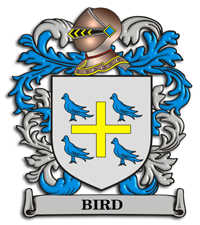

Origin of the Name Bird or Byrd
The surname BIRD was first given to an individual who lived by the sign of the bird; also to one who had the characteristics of a bird. The Irish word for bird is ťan, and names such as O'Neny (sometimes O'Nena), among the chiefs of Moy Ith (County Derry, Ireland) and McEaneny have been Anglicised to Bird since colonists attempted to subjugate the Gaelic way of life. Also the French name L'Oiseau has been anglicised to Bird. Hugh Le Bird (Hughe L'Oise or Lois or Layse) arrived in England with William the Conqueror in 1066 to fight at the Battle of Hastings. His surname is thought to have been derived from his skill at falconry. By the twelfth century the name LE BIRD was well established in England.
The earliest English Birds settled at Brexton or Braxton and at Chester in Cheshire. Many of the Bird descendants travelled to London about the beginning of the thirteenth century to learn trades, such as: silversmiths, goldsmiths, coppersmiths, silk weavers, etc. Some became merchants. A few became artists.
Sometime around the 15th century some families changed the spelling to Byrd. In fact there
are several examples of this taking place in the same family, with two brothers each selecting an alternate spelling. There
are many reasons for this occuring. Several Birds are listed in the Heraldic Visitations of Cheshire 1580, which also describe the Crest used by some Birds at that time.
"Bird or Byrd is Norman in origin. The first man we are aware of to bear this name was a great hunter with the Falcon, he was called Hugo the Bird. The name
continued to be spelled with the 'Le' until the beginning of the 15th century when it was gradually changed to
just Bird. Hugo Le Bird first came to England with William the Conqueror. The Normans invaded England when William, Duke of Normandy, defeated Harold, son of the Earl of Wessex, at the Battle of Hastings in 1066. The earliest English Birds settled
around Brexton or Braxton and at Chester in Cheshire. Chester lies south of Liverpool on the River Dee close to the border of Wales. It is one of the oldest English towns, dating from about A.D. 48 . . . Many of the Bird descendants came down to London about the beginning of the thirteenth century to learn trades, such as: silversmiths, goldsmiths, coppersmiths, silk weavers, etc. Some became merchants. A few became artists. "1
The above offers a brief review of the early Birds in England. A search of early genealogical records reveals several versions of a lineage chart starting with Hugo le Bird, who lived in the latter part of the 11th century in England. Robert Byrd in his family history, states that
it was apparently prepared for the great William Byrd II of the Westover Plantation,
in Charles City, Virginia, in 1702, bringing the line down to William Byrd who married Maria Horsemanden (parents of William Byrd II). It also shows this William to have a brother named Thomas who married Mary Howlett (a widow)
and settled in what is now Delaware.
We are often asked how we are relate to "these famous Byrds of Virginia." It appears that the two brothers, William and Thomas Byrd, came to
America from England in the late 1600s. From William descended the Byrds of Westover, including Adm. Richard E. Byrd and the recent Senator Byrds from Virginia. It is believed our line descends from Thomas Bird's son Thomas, who married Sarah Empson and settled in Delaware, and then later migrated to North Carolina, Tennessee
and other states.
An orlder version of our Bird-Byrd Family Lineage can be found at
http://familytreemaker.genealogy.com/users/b/y/r/Wayne-A-Byrd/
Earlest known Bird Coat of Arms


